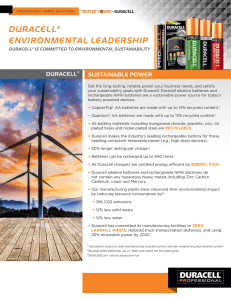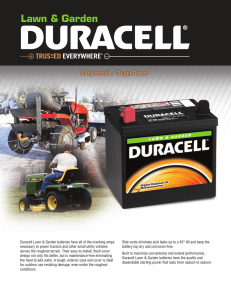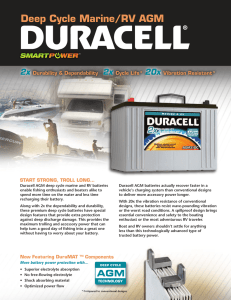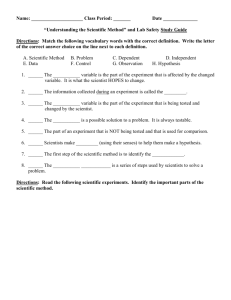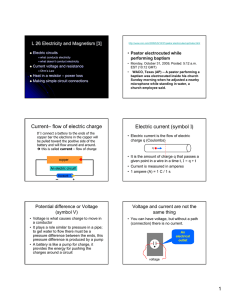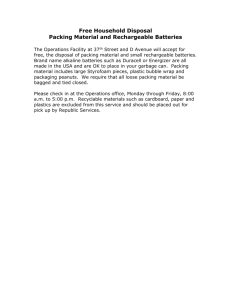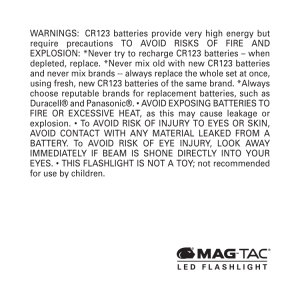COMPLAINT NUMBER 13/538 AWAP 13/010 COMPLAINANT
advertisement
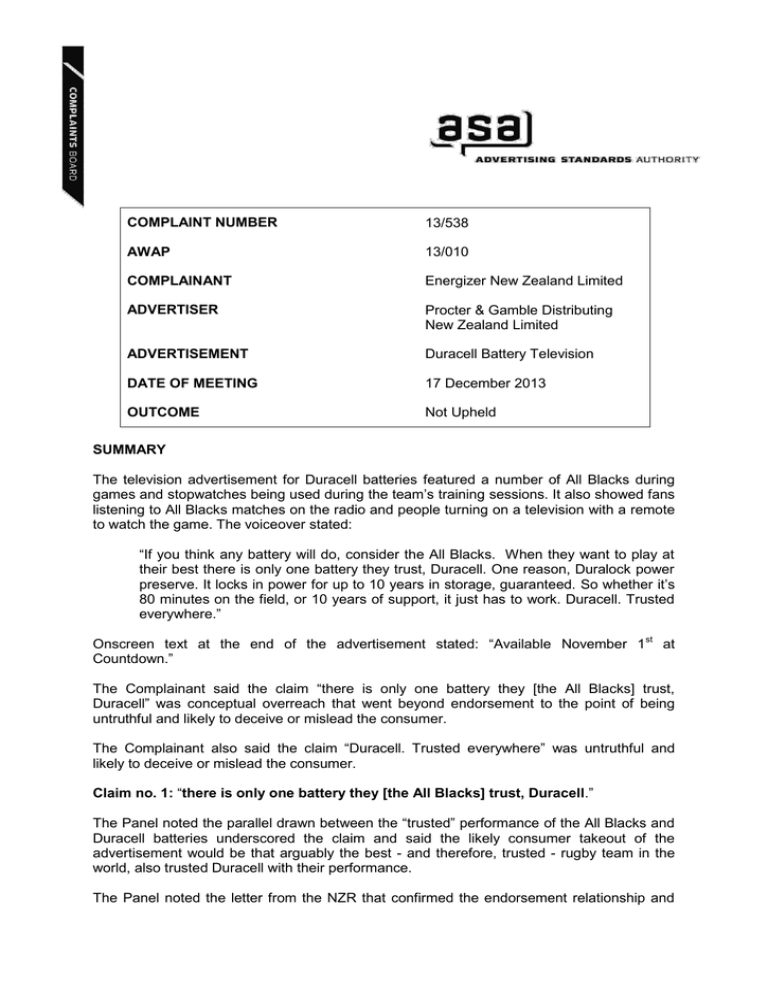
COMPLAINT NUMBER 13/538 AWAP 13/010 COMPLAINANT Energizer New Zealand Limited ADVERTISER Procter & Gamble Distributing New Zealand Limited ADVERTISEMENT Duracell Battery Television DATE OF MEETING 17 December 2013 OUTCOME Not Upheld SUMMARY The television advertisement for Duracell batteries featured a number of All Blacks during games and stopwatches being used during the team’s training sessions. It also showed fans listening to All Blacks matches on the radio and people turning on a television with a remote to watch the game. The voiceover stated: “If you think any battery will do, consider the All Blacks. When they want to play at their best there is only one battery they trust, Duracell. One reason, Duralock power preserve. It locks in power for up to 10 years in storage, guaranteed. So whether it’s 80 minutes on the field, or 10 years of support, it just has to work. Duracell. Trusted everywhere.” Onscreen text at the end of the advertisement stated: “Available November 1st at Countdown.” The Complainant said the claim “there is only one battery they [the All Blacks] trust, Duracell” was conceptual overreach that went beyond endorsement to the point of being untruthful and likely to deceive or mislead the consumer. The Complainant also said the claim “Duracell. Trusted everywhere” was untruthful and likely to deceive or mislead the consumer. Claim no. 1: “there is only one battery they [the All Blacks] trust, Duracell.” The Panel noted the parallel drawn between the “trusted” performance of the All Blacks and Duracell batteries underscored the claim and said the likely consumer takeout of the advertisement would be that arguably the best - and therefore, trusted - rugby team in the world, also trusted Duracell with their performance. The Panel noted the letter from the NZR that confirmed the endorsement relationship and 13/538 AWAP 13/010 had specifically approved the use of the tagline “there is only one battery they [the All Blacks] trust, Duracell.” The Panel said this confirmation was a reasonable and appropriate basis to allow Duracell to make this claim. Therefore, the Panel said the above claim was not misleading or deceptive or likely to mislead or deceive the consumer. Claim no. 2: “Duracell. Trusted everywhere.” The Panel was of the view that “everywhere” was a notion as well as a claim. As such, the Panel accepted the word “everywhere” was also a reference to the many appliances Duracell batteries could be used in and not just a geographic use claim for New Zealand or elsewhere. This was supported by the numerous appliances in which the batteries were used such as in a radio, a stopwatch, in television remotes etc. The Panel also said “everywhere” could be interpreted as being found in extraordinary situations (stopwatches in All Blacks training sessions and megaphones at All Blacks games) as well as ordinary everyday situations (people using them in radios or in television remotes). It also said that use of the word “everywhere” was not solely limited to either New Zealand and/or overseas usage (and therefore, where trusted). However, the Panel did note that Duracell now enjoys wide usage in New Zealand via distribution through a large number of major New Zealand supermarkets as well as being a prominent brand in many countries around the world. The Panel also noted the advertisement promoted the “Duralock power preserve” as a point of difference from other batteries. While the Panel acknowledged the Complainant’s concerns that this was not a new technological advance, the Panel said the Duracell batteries did have this feature and that it engendered a further layer of “trust” in the product’s longevity. Duralock power preserve is also a point of difference between the Advertiser’s product and a significant non-premium segment of the battery market that does not make these durability claims. The Panel was of the view there was no disjuncture between the words “trusted” and “everywhere” and said the overall consumer takeout of the claims that Duracell batteries could be relied on to perform in any of these situations “everywhere”. Therefore, the Panel said this was not misleading or deceptive or likely to mislead or deceive the consumer. Accordingly, the Panel ruled to Not Uphold the complaint. [No further action required] Please note this headnote does not form part of the Decision. PANEL DECISION PROCEDURE The Chairman ruled to deal with the matter by “adjudication with attendance of the parties” pursuant to Rule 3 of the Complaints Procedures of the Advertising Standards Complaints Board. This system was designed to resolve disputes between competitors, and a Panel was appointed. THE PANEL Chairman – Ms S. Taylor (Alternate Public Member of the Advertising Standards Complaints Board). 2 13/538 AWAP 13/010 Co-panelists – Mr N. Keats (Alternate Industry Member of the Advertising Standards Complaints Board) and Miss M. McKee (Alternate Public Member of the Advertising Standards Complaints Board). THE PARTIES The Complainant, Energizer New Zealand Limited. Written submissions by M. Sumpter (Partner, Chapman Tripp). Oral submissions presented by M. Sumpter and A. De Beer, (Marketing Manager, Energizer New Zealand Limited). The Advertiser, Procter & Gamble Distributing New Zealand Limited. Written submissions by P. Stubbs (Partner – Simpson Grierson) and C. Nelson (Senior Associate – Simpson Grierson), Legal Counsel for the Advertiser. Oral submission presented by C. Nelson and S. De Silva Brand Manager, Duracell, Procter and Gamble Australia Pty Ltd. B. Mak, Legal Counsel Procter and Gamble Australia Pty Ltd was in attendance as an observer. Deliberation The Chairman directed the Panel to consider the advertisements with reference to Basic Principle 3 and Rule 2 of the Code of Ethics. This required the Panel to consider whether or not the advertisements contained anything that was misleading or deceptive or likely to mislead or deceive the consumer and whether it contained any statement or visual presentation or created an overall impression which either directly or by implication, or exaggerated claim was misleading or deceptive or likely to deceive or mislead the consumer. (Obvious hyperbole, identifiable as such, is not considered to be misleading.) The Panel confirmed that its role was to consider the advertisement, and the claims made in it, from the perspective of the likely audience. It then had to consider the information provided to it and decide, when taken at face value, whether this information went far enough to substantiate the claims made in the advertisements. It also noted that the onus fell on the Advertiser to substantiate the claims in the advertisement. The Panel also noted the entrenched market position and history of the Complainant and the six year absence of Duracell from the mainstream retail market and the advertisement at the centre of the complaint signalled Duracell’s reintroduction into Countdown supermarkets from 1 November 2013. The Panel noted where the Complainant emphasised that product performance was more important than price and noted the meaning of the word “trust” was central to its deliberations. Claim no. 1: “there is only one battery they [the All Blacks] trust, Duracell.” The Panel noted the Complainant said that the likely consumer takeout of the above claim was that Duracell is such a high performing battery that it is associated with and endorsed by, one of the world’s highest performing team; the All Blacks which the Complainant said went beyond a standard endorsement to a conceptual overreach that implied that Duracell is the only battery the All Blacks trust. The Complainant was of the view that more robust substantiation for the claim was required than that given by the New Zealand Rugby Union Incorporated (NZR) confirming the endorsement and approving the tagline. Looking at the concept of trust in the first claim, the Panel noted where the Advertiser stated: “A number of trusted people, organisations and brands have endorsed Duracell batteries … by agreeing to endorse Duracell, those people and businesses were putting their own 3 13/538 AWAP 13/010 trusted reputations and brands on the line. They do so because they trust Duracell.” The Advertiser continued: “Tying into the reliability of the Duracell batteries and the concept of "trust", a worldwide campaign was developed to use different celebrities, personalities and associated brand / household names who embody and personify trust. A link is drawn between trusting Duracell batteries to work, in ordinary and even extraordinary situations, and the trust that such associated trustworthy people and brands have in the brand and the products.” The Panel was of the view that most consumers were familiar with the commercial relationship that existed between high profile sports teams and their endorsement of particular products. The Panel also noted the parallel drawn between the “trusted” performance of the All Blacks and Duracell batteries underscored the claim and said the likely consumer takeout of the advertisement would be that arguably the best - and therefore trusted - rugby team in the world also trusted Duracell with their performance. The Complainant also contended that the advertisement implied the individual All Blacks shown endorsed Duracell batteries, not just the All Blacks as a team. The Panel noted where the Advertiser responded: “The Advertiser refutes the assertion that the intended effect conveyed by the Advertisement is that individual featured All Blacks use and prefer Duracell exclusively based on performance. Rather, the message conveyed is the All Blacks as a team trust and use Duracell batteries and, so, endorse Duracell batteries. This is clear from the way the Advertisement features the All Blacks training together and playing rugby and using battery powered devices within the team environment, such as a stop watch. Also, the full words of this particular claim are: "Consider the All Blacks. When they want to play at their best, there is only one battery they trust, Duracell". This claim is clearly about the All Blacks as a team in the context of playing / training - it is not about individuals and no individuals are named in the TVC.” The Panel agreed with the Advertiser’s response. The Panel said, particularly when having regard to the images of the All Blacks training and playing together, in conjunction with the words “Consider the All Blacks when they want...” (our emphasis), the likely consumer takeout would be the All Blacks, as a team, endorsed Duracell batteries as opposed to the individual players shown. Looking at the substantiation provided by the Advertiser to support the endorsement of the claim, the Panel noted where the Advertiser reiterated: “The All Blacks as a team trust and use Duracell batteries and, so, endorse Duracell batteries. The New Zealand Rugby Union Incorporated (NZR) has confirmed the claims and that the Advertiser is an official sponsor of the All Blacks in the attached letter dated 14 November 2013. The letter from NZR represents a reasonable and appropriate basis for making the claims, having regard to the nature of the claims. No further substantiation is reasonable or necessary in this context, and certainly not confirmations from individual players.” The Panel agreed and said the likely consumer takeout would be the All Blacks, as a team, endorsed Duracell batteries as opposed to the individual players shown. The Panel accepted that the letter from the NZR confirmed the endorsement relationship, noted in particular the NZR’s specific confirmation that it had approved the words “there is only battery they [the All Blacks} trust, Duracell”, and said it was a reasonable and appropriate basis to allow Duracell to make the claim: “there is only one battery they [the All Blacks] trust, Duracell.” The Panel concluded the above claim was not misleading or deceptive or likely to mislead or deceive the consumer. It followed that the claim was not in breach of Basic Principle 3 or Rule 2 of the Code of Ethics. 4 13/538 AWAP 13/010 Claim no. 2: “Duracell. Trusted everywhere.” The Panel noted the Complainant acknowledged there was an obvious element of hyperbole at play in the word “everywhere,” however, the Complainant said the claim went beyond hyperbole as it implied that Duracell batteries had been widely available in New Zealand. The Complainant said this claim was clearly misleading as the Advertiser had been absent from the New Zealand market for six years and had 0% of the mainstream retail market share in New Zealand between 2006-2013. The Complainant said the Advertiser sought to obfuscate its absence from the domestic market and position itself ahead of competitors with its association with the All Blacks. The Panel turned to the Advertiser’s response to this concern and noted where it stated: “It is clear from the evidence provided that Duracell products are purchased and trusted by many people in the many places around the world where Duracell is sold and that the use of the word ‘Everywhere’ is hyperbole. The Complainant's suggestion that ‘trusted everywhere’ means that the Advertiser must demonstrate and substantiate that Duracell is a ‘universally trusted brand in this country’ is, with respect, an unreasonable interpretation without any logical basis or authority.” The Panel said the “trusted everywhere” was obvious hyperbole and the Complainant’s interpretation of the use of the word “everywhere” was too narrow. It was of the view that “everywhere” was a notion as well as a claim and, as such, had multiple meanings - only one of which meant geographically, however, it acknowledged that Duracell did have an established presence globally despite its six year hiatus from the mainstream retail market in New Zealand and that it now has wide distribution in New Zealand via approximately 144 Countdown supermarkets. The Panel accepted that the word “everywhere” was also a reference to the range of appliances Duracell batteries could be used in. This was supported by the numerous appliances in which the batteries were used in the advertisement such as in a radio, a stopwatch, in television remotes etc. The Panel also noted “everywhere” could be interpreted as being found in extraordinary situations (e.g. stopwatches in All Black’s training sessions and megaphones at All Black games) as well as ordinary everyday situations (people using them in radios or in television remotes). The Panel considered that the Advertiser had substantiated the claim for the reasons it had submitted, namely its 50 year history, global market share, product quality and endorsements by trusted people. The Panel took into account the advertisement promoted the “Duralock power preserve” as a point of difference from approximately 30% of batteries that did not offer this feature. It noted where the Advertiser stated: “This particular Advertisement highlights the Duralock Power Preserve Technology (which guarantees the battery for 10 years in storage) and the importance that "it just has to work". The link to the batteries is that the All Blacks need to trust the batteries to work in their equipment (e.g. stop watch) when they are training / playing and supporters need to trust the batteries to work in their TV remotes and radios to support the All Blacks.” While the Panel acknowledged the Complainant’s concerns that this was not a new technological advance, the Panel said the Duracell batteries did have this feature and that it engendered a further layer of “trust” in the product’s longevity. The Panel was of the view there was no disjuncture between the words “trusted” and “everywhere” and said the overall consumer takeout of the claims that Duracell batteries could be relied on to perform in any of these situations “everywhere”. 5 13/538 AWAP 13/010 Therefore, the Panel concluded this was not misleading or deceptive or likely to mislead or deceive the consumer. As such, the Panel said the claim was not in breach of Basic Principle 3 or Rule 2 of the Code of Ethics. Accordingly, the Panel ruled to Not Uphold the complaint. DESCRIPTION OF ADVERTISEMENT The television advertisement for Duracell batteries featured various members of the All Blacks during games and in training. It also showed fans listening to All Black matches on the radio and people turning on a television with a remote to watch the game. The voiceover stated: “If you think any battery will do, consider the All Blacks. When they want to play at their best there is only one battery they trust, Duracell. One reason, Duralock power preserve. It locks in power for up to 10 years in storage, guaranteed.so whether it’s 80 minutes on the field, or 10 years of support, it just has to work. Duracell. Trusted everywhere.” Onscreen text at the end of the advertisement stated: “Available November 1st at Countdown.” COMPLAINT FROM CHAPMAN TRIPP ON BEHALF OF ENERGIZER NEW ZEALAND LIMITED 1. We act for Energizer NZ Ltd (Energizer). 2. Energizer brings a competitor complaint about a television commercial Procter & Gamble Distributing New Zealand Ltd has just put to air, which features its DURACELL brand alongside the All Blacks (the TVC). 3. The TVC has featured regularly and recently on prime time free-to-air national television. We enclose a copy. 4. Energizer is the market leading battery company in New Zealand. The DURACELL brand has not had market presence (aside from minor quantities of grey market product) in New Zealand for 6 years. The TVC is apparently part of a brand re- launch. 5. It is especially important that claims in the battery market be defensible. As Allan J noted in Energizer NZ Ltd v Panasonic New Zealand Ltd (HC Auckland, CIV-2009404-4087, 16 November 2009), this is an industry where "product performance is critical. There is nothing else, save for price, by which competitors are able to distinguish their products from the competition." Market participants carefully evaluate and monitor claims in the battery industry. 6. 7. Breach of Code of Ethics Energizer believes the TVC is contrary to the standards required by Basic Principle 3 and Rule 2 of the ASA's Code of Ethics. There are two key elements of the TVC which Energizer considers misleading to the public. 6 13/538 AWAP 13/010 8. First, the advertisement claims "there's only one battery [the All Blacks] trust, Duracell". 9. Second, the advertisement claims that DURACELL battery products are "trusted everywhere". 10. The claims, linked by the concept of "trust", are misleading both individually and in overall impression. 11. First claim: All Black product endorsement Energizer understands that product endorsement can be an acceptable form of advertising. 12. The classic relevant example is the Powerade / All Blacks sponsorship arrangement. Powerade claims, legitimately, to be the "performance partner" of the All Blacks. That simply means that there is an endorsement relationship between the two parties, and Powerade enjoys an "official" position as an All Black sponsors' product, and has paid for the privilege. 13. The DURACELL claim is different. DURACELL is not stated to be the All Blacks' official battery product or similar. The TVC claims that DURACELL is the only battery the All Blacks trust. The claim goes beyond a standard association / affiliation endorsement to one that requires substantiation. 14. The TVC features the images of several well-known All Blacks, including Richie McCaw, Conrad Smith, Israel Dagg, Tony Woodcock, Aaron Smith, Sam Cane, Tawera Kerr-Barlow, and, most prominently, Steven Luatua. 15. The intended effect conveyed by the advertisement therefore is that these All Blacks have been satisfied, not just to lend their name to a product in return for money, but to use and prefer that product exclusively on a performance basis in comparison to other brands. Energizer vigorously contests any such comparison, as its products perform as well, if not better, than DURACELL across the battery spectrum. 16. Accordingly, and as the ASA Guidance Note on substantiation confirms, consumers need to have confidence that the advertiser has a reasonable basis for making this claim. It is an absolute claim and sound, relevant, clear and robust evidence from those providing their endorsement would be required to support it. Energizer has seen no such evidence, and, in any event, believes it cannot be provided for a product not seen on these shores in the past 6 years. 17. A high standard of evidence of substantiation is expected, as confirmed in recent decisions of the Board, such as Complaint 12/310, AWAP 12/005 Fujitsu General New Zealand v Black Diamond Technologies Ltd, Complaint 13/064 AWAP 13/001 Foodstuffs (Auckland) Ltd v Progressive Enterprises Ltd and Complaint 12/524 AWAP 12/012 Architectural Profiles Ltd v Fletcher Aluminium. Lack of proper and rigorous testing in those complaints was fatal to the advertisements in question. In particular, anecdotal substantiation was insufficient to provide the genuine basis required for the advertiser's claims. 18. Advertising must be assessed having regard to the effect on reasonable members of the public, which includes the inexperienced and the experienced, the gullible and the astute. An important factor in the New Zealand context is the regard in which the All Blacks are held and the faith the public places in them. If the All Blacks like something, then the public is more likely to share that opinion. And critically, consumers are 7 13/538 AWAP 13/010 unable to verify the claim being made in the TVC. It will only, if ever, be tested by competitor action as here. 19. 20. In the result, the claim is contrary to Rule 2 as it exploits the consumer's lack of knowledge of the true situation, and by implication creates a misleading and deceptive, and unsubstantiated, comparison with Energizer's products. Second claim: "trusted everywhere" Coupled with the first claim, where the All Blacks are misleadingly stated to trust only the battery product which has not been sold in New Zealand for 6 years, the claim "trusted everywhere" is similarly problematic. 21. There is an element of hyperbole to the claim in that no consumer would expect DURACELL batteries to be trusted in places where they could not reasonably be expected to be sold. And DURACELL batteries are not sold everywhere in the world. Overall however it is not a hyperbolic claim. It is a claim that, at the very least, DURACELL batteries are universally trusted products in comparable markets including New Zealand. 22. That must be the intended effect of the claim. If New Zealand were not part of the claim then it would need to be "trusted everywhere else". That claim might be true. But the fact of the matter is that the advertiser has tried to create a reputation it doesn't have in this country through an ambiguous tagline. If DURACELL had claimed to be the "official battery of the All Blacks" and "one of the world's most trusted brands" then there might be no issue. 23. But DURACELL went much further than that. It has tried, through association with one of the most famous sports teams on the planet, to pretend it's never been away. That's unacceptable. It is a claim to pedigree in this country which DURACELL doesn't have. 24. So, once again, DURACELL must substantiate its position. The claim is an absolute one and DURACELL needs to provide evidence to show that it is a universally trusted brand in this country. 25. Correspondence to date Energizer has put P&G on notice of its concerns. We attach the parties' correspondence to date. 26. Outcome Energizer seeks for its complaint to be upheld and for the TVC to be withdrawn. Energizer agrees to pay the ASA's fee for a competitor complaint. CODE OF ETHICS Basic Principle 3: No advertisement should be misleading or deceptive or likely to mislead or deceive the consumer. Rule 2: Truthful Presentation - Advertisements should not contain any statement or visual presentation or create an overall impression which directly or by implication, omission, ambiguity or exaggerated claim is misleading or deceptive, is likely to deceive or mislead the consumer, makes false and misleading representation, abuses the trust of the consumer or exploits his/her lack of experience or knowledge. (Obvious hyperbole, identifiable as such, is not considered to be misleading) 8 13/538 AWAP 13/010 RESPONSE FROM SIMPSON GRIERSON ON BEHALF OF PROCTER & GAMBLE DISTRIBUTING NEW ZEALAND LIMITED 1. We act for Procter & Gamble Distributing New Zealand Limited, the advertiser in the above matter (Advertiser). 2. We refer to your letter dated 22 November 2013 which attached a copy of a complaint from Chapman Tripp, acting for Energizer NZ Ltd (Complainant) in relation to a television commercial for Duracell batteries featuring the All Blacks (Advertisement). 3. Given the nature of the complaint and arguments propounded, the Advertiser has serious doubts about the Complainant's motives in making this complaint, fearing that the Complainant (a competitor with an entrenched position in New Zealand) is more motivated by a desire to protect the Complainant's position and thwart the Advertiser's re-launch of Duracell in New Zealand, than by any genuine concern for consumers. Accordingly, the Advertiser asks that the Board has regard to McGechan J's warning regarding similar competitor complaints: "It would not be in the public interest for any notion to spread that ail a trader need to do to ruin a competitor's product launch is find some arguable item in the competitor's promotional material which might be labelled misleading or deceptive, and then apply urgently to the Court for an interim injunction restraining use of those promotional materials. Interim injunctions in this area should not be allowed to become a matter of mere routine, turning the Court into a tool for marketing gamesmanship"? 1 4. In your letter you identified the following Advertising Codes of Practice as being relevant to the complaint made against the Advertisement: (a) Code of Ethics - Basic Principle 3; and (b) Code of Ethics - Rule 2. The Product 5. The Advertisement which is the subject of the complaint is an advertisement about Duracell batteries and the Duralock Power Preserve™ Technology (which guarantees the batteries for 10 years in storage). The Insight – Trust 6. The Advertiser considers its Duracell product to be a reliable and trusted product. It is an important feature of batteries that consumers can trust the batteries to work, when they need them to work. 7. Duracell is the world's leading manufacturer of alkaline batteries. To become the world leader, customers must trust the product. That trust is demonstrated by: (a) history, with the Duracell brand celebrating its 50th anniversary in 2014; (b) #1 global market share measured by sales value and sales volume across key markets worldwide; (c) quality, backed by the Duracell guarantees; and 9 13/538 AWAP 13/010 (d) quality endorsements, by trusted people, organisations and brands. 8. History: The manufacturers of Duracell came together in the 1920s and the success of the durable mercury cell battery, particularly during World War II, led to the forming of the Mallory Battery Company. Kodak cameras of the 1950s with built in flashes required more power from a battery in a smaller size, which led to the development of AAA sized alkaline batteries. This photographic demand put alkaline cell batteries on the map and the Duracell brand was introduced in 1964. 9. Market Leadership: Over the years, Duracell has proved to be very successful worldwide, and holds the #1 position in North America, Europe, Latin America and Africa. According to Nielsen reports for the year ended June 2013, Duracell was the top selling battery brand based on both value share (ie. sales $) and volume share (ie. volume in units). The source data is based on 25 markets which Procter & Gamble subscribe to, out of 59 Nielsen reported markets - noting that these 25 markets represent 85.5% of the global battery market covered by Nielsen's. A letter evidencing this from Nielsen to the Advertiser's parent company is attached. 10. Quality Guarantee: Part of the reason for this success is the quality of the Duracell product, backed up by Duracell guarantees. Duracell guarantees the quality of all Duracell branded products. This guarantee operates independently of the retailer, and the retailer is not required to do anything. There is a free call number on pack. Also, as technologies advance, so do the Duracell guarantees. The Duralock Power Preserve Technology (featured in the Advertisement) is guaranteed to lock in power for up to 10 years in storage. 11. Endorsements: A number of trusted people, organisations and brands have endorsed Duracell batteries. Examples include National Geographic, Hasbro, BrickHouse Child Locator, I MAX, the makers of the Lord of the Rings movies, Bon Jovi and the All Blacks. By agreeing to endorse Duracell, those people and businesses were putting their own trusted reputations and brands on the line. They do so because they trust Duracell. Campaign Idea 12. Tying into the reliability of the Duracell batteries and the concept of "trust", a worldwide campaign was developed to use different celebrities, personalities and associated brand / household names who embody and personify trust. A link is drawn between trusting Duracell batteries to work, in ordinary and even extraordinary situations, and the trust that such associated trustworthy people and brands have in the brand and the products. 13. The tagline "Trusted Everywhere" was developed. 14. For perspective, the "Trusted Everywhere" campaign is a global one that is more than a decade old and advertisements featuring the "trust" concept are used worldwide. Examples can be found at these links: (a) Duracell "Trusted Everywhere" "BrickHouse Child Locator" Campaign: This TVC advertises the use of Duracell batteries in BrickHouse Child Locators (a device to locate children and so a product that parents need to trust), using the "Trusted Everywhere" tagline. See: http://www.youtube.com/watch?v=hGCv7RzEwR8&list=PL3C0C9B6B3DCC1A9 C&index=4 10 13/538 AWAP 13/010 (b) Duracell "Trusted Everywhere" "IMAX: Earth and Space" Campaign; This TVC advertises the use of Duracell batteries by IMAX in their cameras when filming in space, which the filmmakers need to trust to capture the vital images for their film. See: http://www.youtube.com/watch?v=4lw5PFm910U (c) Duracell "Trusted Everywhere" "Bon Jovi" Campaign. This TVC advertises the use of Duracell batteries by Bon Jovi in his microphones during his shows, using the "Trusted Everywhere" tagline. See: http://www.youtube.com/watch?v=KrXruyfxbu4 (d) Duracell "Trusted Everywhere" "Lord of the Rings" Campaign. This TVC advertises the use of Duracell batteries by the filmmakers of "Lord of the Rings" "in every one of their light makers", using the "Trusted Everywhere" tagline. See: http://www.youtube.com/watch?v=aO-TAv1nvVA Execution of Campaign 15. The Advertisement has been provided to the ASCB and we summarise the 30 second variant of the Advertisement below. This particular Advertisement highlights the Duralock Power Preserve Technology (which guarantees the battery for 10 years in storage) and the importance that "it just has to work". The link to the batteries is that the All Blacks need to trust the batteries to work in their equipment (eg. stop watch) when they are training / playing and supporters need to trust the batteries to work in their TV remotes and radios to support the All Blacks. (a) (VO): "If you think any battery will do, consider the All Blacks." (i) (ii) (iii) (b) (VO) "When they want to play at their best, there is only one battery they trust, Duracell." (i) (ii) (c) Shot of All Blacks playing a test match against Argentina. Shot of a stop watch and All Blacks doing sprint training, weight lifting and stretching. (VO) "One reason, Duralock Power Preserve. It locks in power for up to 10 years in storage, guaranteed. So whether it's 80 minutes on the field or 10 years of undying support, it just has to work." (i) (ii) (iii) (iv) (v) (vi) (d) Shot of an All Blacks player's hands powdered and taped for training. Stylised image of a battery. Shots of All Blacks players on exercise cycles. Super: "Duralock Power Preserve Technology" and stylised image of a lock. Stylised image of a Duracell battery Shot of All Blacks playing a test match against Argentina. Shot of fans watching rugby on TV and using their remote control. Shots of various All Blacks supporters. Shot of young boy listening to an All Blacks game on a battery powered radio (VO) "Duracell, trusted everywhere." (i) (ii) Stylised image of a Duracell battery. Super: Available November 1st at Countdown 11 13/538 AWAP 13/010 (iii) (iv) Super: the word "Duracell" and an All Blacks logo. Super: the words "Trusted Everywhere" Summary 16. The endorsement by the All Blacks of Duracell batteries is both legitimate and genuine, and not in any way misleading. The All Blacks as a team trust and use Duracell batteries and, so, endorse Duracell batteries. The New Zealand Rugby Union Incorporated (NZR) has confirmed the claims and that the Advertiser is an official sponsor of the All Blacks in the attached letter dated 14 November 2013. The letter from NZR represents a reasonable and appropriate basis for making the claims, having regard to the nature of the claims. No further substantiation is reasonable or necessary in this context, and certainly not confirmations from individual players. 17. Further the "Trusted Everywhere" tag line is one that has been used in a variety of similar TVCs and other advertisements worldwide for more than 10 years (since 2003 in North America, since 2011 in Australia and since 2013 in New Zealand). The fact that Duracell is a trusted product is supported by information provided regarding Duracell's history, market leadership, quality (backed by guarantees) and quality endorsements from trusted people, organisations and brands. It is clear from the evidence provided that Duracell products are purchased and trusted by many people in the many places around the world where Duracell is sold and that the use of the word "Everywhere" is hyperbole. The Complainant's suggestion that "trusted everywhere" means that the Advertiser must demonstrate and substantiate that Duracell is a "universally trusted brand in this country" is, with respect, an unreasonable interpretation without any logical basis or authority. Code of Ethics / Establish Principles / Substantiation Guidance 18. Code of Ethics - Basic Principle 3 "No advertisement should be misleading or deceptive or likely to mislead or deceive the consumer." 19. Code of Ethics - Rule 2 "Truthful Presentation - Advertisements should not contain any statement or visual presentation or create an overall impression which directly or by implication, omission, ambiguity or exaggerated claim is misleading or deceptive, is likely to deceive or mislead the consumer, makes false and misleading representation, abuses the trust of the consumer or exploits his/her lack of experience or knowledge. (Obvious hyperbole, identifiable as such, is not considered to be misleading)." 20. In assessing whether any claim is misleading or deceptive, it useful to briefly summarise the well-established legal principles, which were conveniently set out by Gilbert J in Godfrey Hirst v Cavalier Bremworth Limited in July this year: "The following legal principles are well established: (a) Whether the conduct complained of is misleading or deceptive is to be determined objectively in the context of the particular circumstances, including the characteristics of the persons said to be affected. (b) Conduct is likely to mislead or deceive if it might well happen. There must be a real risk of this occurring, not merely a possibility. 12 13/538 AWAP 13/010 21. (c) Where the conduct is directed towards a wide section of the community, the matter is to be assessed having regard to all who come within that section including 'the astute and the gullible, the intelligent and the not so intelligent, the well educated as well as the poorly educated, men and women of various ages pursuing a variety of vocations'. (d) Consumers may be prone to some 'looseness of thought'. They may not undertake careful analysis and may be influenced by the overall impression conveyed. However, they 'will not be lacking in perception and can be expected to bring a reasonable degree of common sense'.'2 We also note the following key aspects from the ASA Guidance note on substantiation. (a) "The Complaints Board will consider the likely consumer take-out of the whole advertisement, not just the claim in isolation." (b) "Consumers need to have confidence that the Advertiser has a reasonable basis for making the claim." (c) "The substantiation provided must equal the claim being made" and relevant factors include, the "type of claim", "type of product', the "benefits if the claim is true" and the "level of substantiation experts in the field would agree is reasonable." Complaint / Response 22. The single complaint has been made by the Complainant (a competitor), in its letter to the Board dated 15 November 2013. The Complainant considers the following claims in the Advertisement to be misleading. (a) "[T]here's only one battery [the All Blacks] trust, Duracell". (b) "Trusted Everywhere". "There's only one battery [the All Blacks] trust, Duracell" 23. In terms of the claim that "there's only one battery [the All Blacks] trust, Duracell, the Complainant: (a) states that they understand that product endorsements can be an acceptable form of advertising; (b) asserts (wrongly in our view) that this claim goes beyond a standard association / affiliation endorsement to one that requires substantiation, but the Complainant offers no clear authority or explanation for this assertion; (c) asserts (wrongly in our view) that the intended effect conveyed by the advertisement is that the individual All Blacks featured in the Advertisement have been satisfied, not just to lend their name to a product in return for money, but to prefer to use that product exclusively on a performance basis in comparison to other brands; 13 13/538 AWAP 13/010 24. (d) refers to the ASA Guidance note on substantiation and notes that consumers need to have confidence that the advertiser has a reasonable basis for making this claim; and (e) refers to various recent decisions of the Board as authority for the level of substantiation required. Taking into account previous decisions and specific elements of the Advertisement, the Advertiser responds as follows. (a) The Advertisement (including the claim that "there's only one battery [the All Blacks] trust, Duracell) is entirely consistent with Basic Principle 3 and Rule as it is not misleading or deceptive, nor is it likely to mislead or deceive a consumer. The overall impression of the Advertisement is that the All Blacks as a team trust Duracell batteries and endorse Duracell batteries. With respect, there appears to be no reasonable basis for any further assertion, other than, as a competitor, the Complainant is searching for some reason to complain. (b) We agree with the Complainant that product endorsements are an acceptable form of advertising, and submit that the Advertisement is a product endorsement and an acceptable form of advertising. (c) The Advertiser is an official sponsor of the All Blacks pursuant to an agreement with NZR, as evidenced by a letter from NZR dated 14 November 2013. In that letter, NZR confirms that the Advertiser is an official sponsor of the All Blacks, that the All Blacks use Duracell batteries and that NZR consents to the association of the All Blacks with the "Trusted Everywhere" campaign and the specific claim that "there's only one battery the All Blacks trust: Duracell". The Advertiser can also confirm that it supplies Duracell products to the All Blacks for their use, and so knows that the All Blacks do use Duracell batteries. Furthermore, with a brand as valuable as the All Blacks, the NZR are very particular in their choice of sponsors, so they quite sensibly only choose partners and products they trust. (d) The Advertiser refutes the assertion that the intended effect conveyed by the Advertisement is that individual featured All Blacks use and prefer Duracell exclusively based on performance. Rather, the message conveyed is the All Blacks as a team trust and use Duracell batteries and, so, endorse Duracell batteries. This is clear from the way the Advertisement features the All Blacks training together and playing rugby and using battery powered devices within the team environment, such as a stop watch. Also, the full words of this particular claim are: "Consider the All Blacks. When they want to play at their best, there is only one battery they trust, Duracell". This claim is clearly about the All Blacks as a team in the context of playing / training - it is not about individuals and no individuals are named in the TVC. (e) It will be obvious to any consumer who "can be expected to bring a reasonable degree of common sense" that Duracell's manufacturer (the Advertiser) is a sponsor of the All Blacks and that the Advertisement is part of a paid endorsement. With respect, the Complainant's assertions that individual players use and prefer Duracell to other products based on performance etc, is an attempt to take the single claim out of context and twist its interpretation to find a reason to complain about the Advertisement. (f) A reasonable consumer recognising that the Advertisement has been made in 14 13/538 AWAP 13/010 connection with a sponsorship arrangement with the All Blacks, would accept that a reasonable basis for making the claim is that the All Blacks agreed to the claim. As explained above, the Advertiser is an official sponsor of the All Blacks pursuant to an agreement with NZR and that NZR clearly consents to and approves of the Advertisement generally and the specific claims. The All Blacks is one of the most recognised brands in the world of sport, so the NZR are very rigorous in their choice of sponsors and very rigorous in reviewing the campaigns associated with, and advertising materials featuring, the All Blacks. The NZR must trust their sponsors and must trust the brands they associate with the All Blacks. Furthermore, the All Blacks do use Duracell batteries. We submit that, a reasonable consumer would accept the Advertisement for what it is, a product endorsement by the All Blacks of a product the All Blacks trust and use. 25. 26. Having regard to the ASA guidelines on substantiation, we comment as follows. (a) "The Complaints Board will consider the likely consumer take-out of the whole advertisement, not just the claim in isolation." - The Advertiser submits that the overall likely consumer take out is that the All Blacks as a team trust Duracell batteries and, so, endorse Duracell batteries. The Complainant has tried to interpret the claim in isolation and so has tried to argue that specific substantiation be provided that individual All Blacks players have confirmed that they trust and use Duracell batteries. We submit that the Complainant's approach is inconsistent with the ASA Guidelines. (b) "Consumers need to have confidence that the Advertiser has a reasonable basis for making the claim." - We submit that the reasonable level of substantiation is this context is that NZR confirms (as they have) that the Advertiser is an official sponsor, that NZR confirmed and approved of the Advertisement and the specific claims, and that the All Blacks do trust Duracell batteries. Further, the Advertiser supplies Duracell batteries to the All Blacks in connection with the sponsorship. (c) "The substantiation provided must equal the claim being made" and relevant factors include, the "type of claim", "type of product', the "benefits if the claim is true", the "ease...of substantiation" and the "level of substantiation experts in the field would agree is reasonable." - We submit that the substantiation provided, equals that claim being made. The claim is an endorsement by the All Blacks of Duracell products, and NZR has confirmed that the All Blacks do trust and use Duracell products. The benefits if the claim is true are that consumer will also trust and possibly use Duracell batteries, because the All Blacks do. As there is no scientific or technical claim being made here, the relevant expertise for assessing the reasonable level of substantiation is marketing / legal expertise. It is standard practice in sponsorship arrangements with sports teams that the relevant sporting organisation (ie NZR) approves of all advertising materials and claims, to ensure that the claims are correct. That was done in this case. There is no legal basis for requiring any form of confirmation from individual players, as the endorsement is clearly from the All Blacks as a team, not from individual players. Further, it is not commercially realistic or reasonable to require individual players to substantiate claims made in respect of the team that have been approved by their employer, which is the party to the sponsorship arrangement. We have considered the authorities on substantiation referred by the Complainant3 and we do not consider that they are directly relevant in the current context. Those complaints relate to: (a) An aspirational claim - "our mission Rotorua's lowest grocery prices", where 15 13/538 AWAP 13/010 cluded that absolute claims had to be substantiated and aspirational claims had to be genuine; 27. (b) A product superiority claim - "smoothest sliding doors", where the Board concluded that an absolute claim about a product feature had to be substantiated; and (c) A product superiority claim - "quietest heat pumps" and "heat more effectively and quietly', where the Board concluded that these were robust claims requiring unequivocal substantiation, not simply anecdotal substantiation. The claim of "there's only one battery [the All Blacks] trust, Duracell" is not an aspirational claim like (a) above, nor is it a specific product feature claim like (b) and (c). Accordingly, we have simply applied the ASA's own guideline directly to the facts and have provided substantiation equal to the claim in accordance with those guidelines. "Trusted everywhere" 28. In terms of the claim "trusted everywhere", the Complainant (a) acknowledges that there is an element of hyperbole to the claim in that no consumer would expect Duracell batteries to be trusted in places where they could not reasonably be expected to be sold; (b) asserts (wrongly in our view) that this claim means that Duracell must demonstrate that Duracell products are universally trusted in New Zealand; (c) and asserts (wrongly in our view) that by using the tagline "trusted everywhere" hat the Advertiser is trying to create a reputation or to have a pedigree in New Zealand that it doesn't have. 29. Notably, the Complainant does not cite any authority for its assertions in respect of the "trusted everywhere" tag line. 30. Taking into account previous decisions and specific elements of the Advertisement, the Advertiser responds as follows. (a) The Advertisement and the "trusted everywhere" tag line is entirely consistent with Basic Principle 3 and Rule 2 as it is not misleading or deceptive, nor is it likely to mislead or deceive a consumer. The overall impression of the tag line is that Duracell batteries are trusted by many people, in many places, including by the All Blacks. With respect to the Complainant, any further inference drawn appears to be more concerned about competition from Duracell than any genuine concern for consumers. (b) We agree with the Complainant that there is an element of hyperbole, in that no reasonable consumer would expect Duracell batteries to be trusted in places where they are not, or have not, been sold. The reference to "everywhere" is intended to convey the message that Duracell batteries are sold and used by people in both extraordinary & ordinary situations, and that the product is trusted to perform in those places. Use of hyperbole is common in slogans and tag lines, with high profile examples including: "It's everywhere you want to be" (Visa), "The Ultimate Driving Machine" (BMW), "The world's favourite airline" (British Airways). 16 13/538 AWAP 13/010 31. (c) We refute any assertion that the "trusted everywhere" claim means that the Advertiser must demonstrate that Duracell products are universally trusted in New Zealand, or that the Advertiser is trying to create a reputation in New Zealand that it does not have. The Advertiser has clearly demonstrated at paragraphs 6 to 11 above, that Duracell is a trusted brand and product around the world. Furthermore, while Duracell does already have a reputation and pedigree in New Zealand based upon historic sales and advertising (eg. The Duracell bunny is well known in New Zealand), current sales and its international presence and profile, the tag line "trusted everywhere" makes no reference to New Zealand. Requiring further specific justification in respect of trust in New Zealand is simply not required given the nature of the claim and the substantiation provided by NZR in respect of the specific All Blacks claim. (d) It is illogical to conclude that a statement of "trusted everywhere" means specifically trusted in New Zealand. Having regard to the accepted hyperbole, "trusted everywhere" means that the Duracell is trusted by many people in many places where products are sold. If the Complainant's argument was accepted, a new entrant to New Zealand could never claim to be "trusted", even if they were a world leader in their field. New Zealand is only a very small part of the world economy, and there are many world leading products and brands which are not sold in New Zealand at all – that does not mean that such products are not "trusted", nor does it mean that if those products or brands enter the New Zealand market that they could not claim to be "trusted" based on their reputation developed overseas. Of course, if, like Duracell, there is a claim that the product is trusted by a particular New Zealand person or organisation, then like the Advertiser, that specific trust claim would need to be substantiated like the Advertiser has done in this case. To further assist the Board, we note the following example where a complaint was not upheld in relation to a "trusted" claim. This example demonstrates the level of substantiation required to substantiate that a business or product is trusted. (a) Decisions 10/171: A TVC by Platinum Homes (NZ) Ltd contained the following voiceover: "...Platinum Homes, New Zealand's trusted name in residential building...". The complainant alleged that this phrase was misleading and that the advertiser in that case had not substantiated the claim of being trusted. This complaint was considered under Code of Ethics Rule 2 - Truthful Representation. The Chairman's ruling included the following extract: "The Complaints Board noted the Agency's submission where it said " Platinum Homes is a trusted name in the residential building market in New Zealand ... because consumers trust the[m]to do the work." The Complaints Board took into account the advice received that Platinum Homes had been in the residential building market for over five years and had built homes across the country. The Complaints Board was of the view that adequate substantiation had been provided in relation to the claim that the Advertiser was a "trusted name in residential building in New Zealand". 32. Given that Platinum Homes could substantiate that it was "trusted" based on five years of doing business across New Zealand, we submit that Duracell is very clearly a "trusted" product by comparison given Duracell's: (a) history, with the Duracell brand celebrating its 50th anniversary in 2014; 17 13/538 AWAP 13/010 (b) market leadership, measured by sales value and sales volume across key markets worldwide; (c) quality, backed by the Duracell guarantees; and (d) quality endorsements, by trusted people, organisations and brands. Conclusion 33. This letter demonstrates that the Advertisement is not misleading or deceptive or likely to mislead or deceive a consumer. The Advertisement does not contain any statement, or create an overall impression which is misleading or deceptive. (a) The endorsement by the All Blacks of Duracell batteries is both legitimate and genuine, and not in any way misleading. The statement that "there's only one battery [the All Blacks] trust, Duracell has clearly been accepted and approved by NZR and simply conveys to consumers that the All Blacks as a team trust Duracell batteries and, so, endorse Duracell batteries. (b) The words "trusted everywhere" convey to the reasonable consumer that Duracell batteries are trusted by many people in many places. The tag line "trusted everywhere" is, in part, hyperbole in relation to the word "everywhere" and the trusted claim is clearly supported by evidence of Duracell's history, market leadership, quality (backed by guarantees) and quality endorsements. 34. The evidence submitted and prior determinations of the Board provide the necessary parameters to enable the Board to determine not to uphold the complaint brought against this Advertisement. 35. The Advertiser will attend the hearing (representatives to be confirmed) and looks forward to receiving notice on the same from the Board in due course. 1 ER Squibb & sons (NZ) Ltd v ICI New Zealand Ltd (1988) 3 TCLR 296AT 324 Godfrey Hirst NZ Limited v Cavalier Bremworth Limited [2013] NZHC 1907 at para [20] 3 Complaint 12/310 AWAP 12/005 Fujitsu General New Zealand v Black Diamond Technologies Ltd, Complaint 13/064 AWAP 13/001 Foodstuffs (Auckland) Ltd v Progressive Enterprises Ltd and Complaint 12/524 AWAP 12/012 Architectural Profiles Ltd v Fletcher Aluminium 2 RESPONSE FROM COMMERCIAL APPROVALS BUREAU ON BEHALF OF THE MEDIA We won't put forward a response for this AWAP as the matter of contention doesn't involve standards of claim. 18
